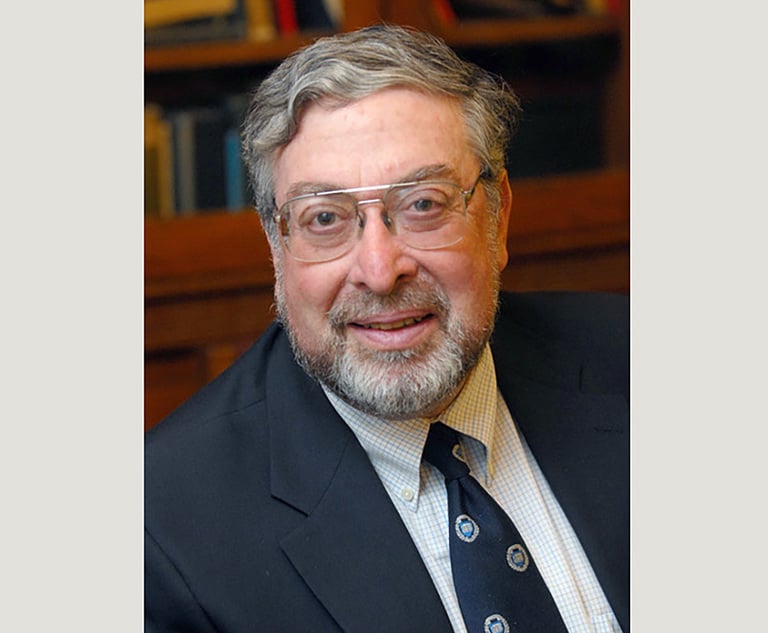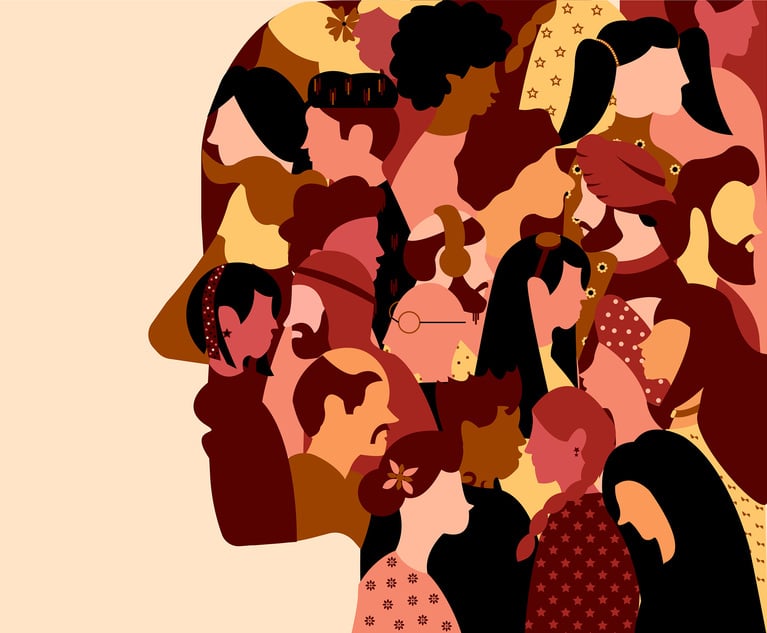 New York City firefighters and journalists stand near the area known as Ground Zero after the collapse of the Twin Towers September 11, 2001 in New York City.NEW YORK – SEPTEMBER 11
New York City firefighters and journalists stand near the area known as Ground Zero after the collapse of the Twin Towers September 11, 2001 in New York City.NEW YORK – SEPTEMBER 11 Continued Delay of 9/11 Prosecutions Leaves Open Wounds
A seemingly endless string of disappointments has failed to bring closure or resolve unanswered questions.
September 13, 2022 at 10:15 AM
4 minute read
CommentaryThe events of September 11, 2001 are forever with us. Whether we are old enough to remember where we were or have heard stories from family, friends and colleagues, we are reminded every year on the anniversary as the names of those we lost are read at the events commemorating the tragedy. We also have watched countless first responders and others who lived and worked at ground zero die from diseases caused by the event. In fact, nearly 2000 deaths have been attributed to post-9/11 illnesses and that number is sadly growing.
On March 1, 2003, the United States captured one of the plotters of the attack, Khalid Sheikh Mohammed. Many of us remember the picture of him being hauled away by intelligence agents from a hideout in Rawalpindi, Pakistan. He was totally disheveled and reminded some of us of John Belushi. The global manhunt for al-Qaeda's number three leader had taken 18 months. But as the 21st anniversary of the attacks occupy virtually every news station, Mohammed and four other men accused of 9/11-related crimes still sit in the Guantanamo Bay prison, their planned trials before a military tribunal endlessly postponed. If convicted, Mohammed could face the death penalty, and as we all understand, these proceedings, like most death penalty cases, can take what feels to families of the victims a lifetime.
This content has been archived. It is available through our partners, LexisNexis® and Bloomberg Law.
To view this content, please continue to their sites.
Not a Lexis Subscriber?
Subscribe Now
Not a Bloomberg Law Subscriber?
Subscribe Now
NOT FOR REPRINT
© 2025 ALM Global, LLC, All Rights Reserved. Request academic re-use from www.copyright.com. All other uses, submit a request to [email protected]. For more information visit Asset & Logo Licensing.
You Might Like
View All
Special Series Part 5: The State’s Bond Lock Impermissibly Delegates Legislative Authority

Special Series Part 4: The Statutory Guardrails Impermissibly Bind Future Legislatures

The Appropriate Exemption in Students for Fair Admissions v. President & Fellows of Harvard College
4 minute read
Special Series Part 1: Are Connecticut’s Budget Guardrails Constitutional?
Trending Stories
- 16-48. It’s Comp Time Again: How To Crush Your Comp Memo
- 2'Religious Discrimination'?: 4th Circuit Revives Challenge to Employer Vaccine Mandate
- 3Fight Over Amicus-Funding Disclosure Surfaces in Google Play Appeal
- 4The Power of Student Prior Knowledge in Legal Education
- 5Chicago Cubs' IP Claim to Continue Against Wrigley View Rooftop, Judge Rules
Who Got The Work
Michael G. Bongiorno, Andrew Scott Dulberg and Elizabeth E. Driscoll from Wilmer Cutler Pickering Hale and Dorr have stepped in to represent Symbotic Inc., an A.I.-enabled technology platform that focuses on increasing supply chain efficiency, and other defendants in a pending shareholder derivative lawsuit. The case, filed Oct. 2 in Massachusetts District Court by the Brown Law Firm on behalf of Stephen Austen, accuses certain officers and directors of misleading investors in regard to Symbotic's potential for margin growth by failing to disclose that the company was not equipped to timely deploy its systems or manage expenses through project delays. The case, assigned to U.S. District Judge Nathaniel M. Gorton, is 1:24-cv-12522, Austen v. Cohen et al.
Who Got The Work
Edmund Polubinski and Marie Killmond of Davis Polk & Wardwell have entered appearances for data platform software development company MongoDB and other defendants in a pending shareholder derivative lawsuit. The action, filed Oct. 7 in New York Southern District Court by the Brown Law Firm, accuses the company's directors and/or officers of falsely expressing confidence in the company’s restructuring of its sales incentive plan and downplaying the severity of decreases in its upfront commitments. The case is 1:24-cv-07594, Roy v. Ittycheria et al.
Who Got The Work
Amy O. Bruchs and Kurt F. Ellison of Michael Best & Friedrich have entered appearances for Epic Systems Corp. in a pending employment discrimination lawsuit. The suit was filed Sept. 7 in Wisconsin Western District Court by Levine Eisberner LLC and Siri & Glimstad on behalf of a project manager who claims that he was wrongfully terminated after applying for a religious exemption to the defendant's COVID-19 vaccine mandate. The case, assigned to U.S. Magistrate Judge Anita Marie Boor, is 3:24-cv-00630, Secker, Nathan v. Epic Systems Corporation.
Who Got The Work
David X. Sullivan, Thomas J. Finn and Gregory A. Hall from McCarter & English have entered appearances for Sunrun Installation Services in a pending civil rights lawsuit. The complaint was filed Sept. 4 in Connecticut District Court by attorney Robert M. Berke on behalf of former employee George Edward Steins, who was arrested and charged with employing an unregistered home improvement salesperson. The complaint alleges that had Sunrun informed the Connecticut Department of Consumer Protection that the plaintiff's employment had ended in 2017 and that he no longer held Sunrun's home improvement contractor license, he would not have been hit with charges, which were dismissed in May 2024. The case, assigned to U.S. District Judge Jeffrey A. Meyer, is 3:24-cv-01423, Steins v. Sunrun, Inc. et al.
Who Got The Work
Greenberg Traurig shareholder Joshua L. Raskin has entered an appearance for boohoo.com UK Ltd. in a pending patent infringement lawsuit. The suit, filed Sept. 3 in Texas Eastern District Court by Rozier Hardt McDonough on behalf of Alto Dynamics, asserts five patents related to an online shopping platform. The case, assigned to U.S. District Judge Rodney Gilstrap, is 2:24-cv-00719, Alto Dynamics, LLC v. boohoo.com UK Limited.
Featured Firms
Law Offices of Gary Martin Hays & Associates, P.C.
(470) 294-1674
Law Offices of Mark E. Salomone
(857) 444-6468
Smith & Hassler
(713) 739-1250










